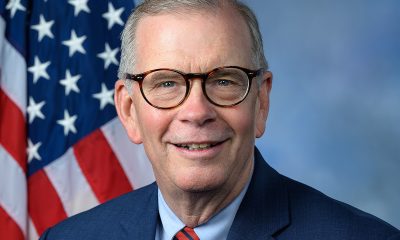News
How goes transition to open military service? Don’t ask
Gay troops face host of new challenges after repeal of ‘Don’t Ask, Don’t Tell’
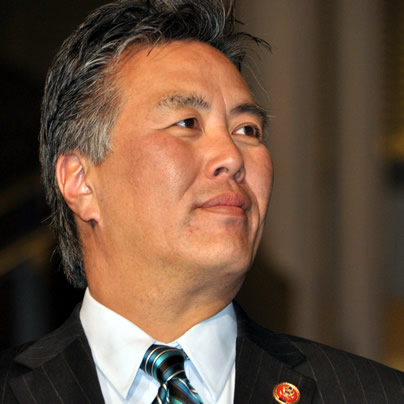
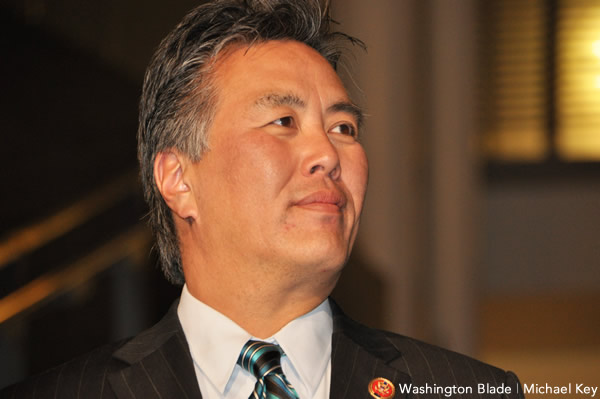
Rep. Mark Takano (D-Calif.) has co-sponsored a bill that would ensure married gay veterans receive benefits. (Washington Blade photo by Michael Key)
Despite rosy pronouncements from the Obama administration and others about the supposedly smooth transition to open service in the military following the lifting of “Don’t Ask, Don’t Tell,” a host of new problems has emerged for gay and lesbian troops.
Stephen Peters, president of the American Military Partners Association, said “there are clearly challenges that remain” for gay service members following the implementation of open service.
“These military families are still facing challenges that need to be addressed sooner rather than later,” Peters said. “All they are asking for is to be treated the same way as their counterparts — simple equality, no more and no less.”
In the past week, attention has focused on state national guard units refusing to process spousal benefit applications for troops in same-sex marriages; an Army base having to make special arrangements for chaplains to accommodate a lesbian couple; gay veterans not receiving benefits in non-marriage equality states; and the condition for gay cadets at the Air Force Academy, where a practitioner of “ex-gay” conversion therapy holds a leadership role.
Nat’l Guards refusing benefits for gay troops
Several state national guards continue to refuse to process spousal benefit applications for troops in same-sex marriages, citing state constitutional amendments banning gay nuptials. This comes after an edict from Defense Secretary Chuck Hagel saying he’s directed the National Guard Bureau to ensure the guards follow Pentagon policy to provide these benefits everywhere in the wake of the Supreme Court decision against the Defense of Marriage Act.
One state that has received significant attention is Oklahoma, where Gov. Mary Fallin on Nov. 6 ordered her national guard facilities to stop processing benefits altogether and directed all couples — gay and straight — to federal installations within her state to apply for benefits.
“Oklahoma law is clear,” Fallin said. “The state of Oklahoma does not recognize same-sex marriages, nor does it confer marriage benefits to same-sex couples. The decision reached today allows the National Guard to obey Oklahoma law without violating federal rules or policies.”
Like other states, Fallin cited a constitutional amendment prohibiting same-sex marriage or conferral of spousal benefits to gay couples. In the case of Oklahoma, voters approved an amendment banning same-sex marriage in 2004 by 75 percent of the popular vote.
According to the National Guard Bureau, a total of five states are not complying with the edict: Texas, Mississippi, Georgia, Louisiana and South Carolina. The list omits Oklahoma, but the Guard wouldn’t respond to a request for comment on why the state isn’t included.
These states maintain only the processing of same-sex benefit applications is being denied, so once these troops are enrolled in the Defense Enrollment Eligibility Reporting System, they’d be able to receive them wherever their assignment. However, LGBT advocates have said participation by same-sex couples in national guard activities, such as “Strong Bonds” retreats for married couples, is threatened by these states’ decisions.
Although the Pentagon has threatened additional action if these states refuse to comply with the Defense Department directive on benefits, a Defense official wouldn’t speculate as to what this action would be.
“These are federal ID cards paid for with federal funding to provide federally mandated benefits,” the official said. “The Secretary has directed General Grass to resolve this issue with the TAGs. We’re not going to speculate on legal options at this time.”
Some ideas that have been speculated include a lawsuit against these states, deprivation of federal funds or federalization of these guards by President Obama.
Gay veterans not receiving spousal benefits
Also gaining attention in recent weeks is the inability of gay veterans to obtain certain spousal benefits if they live in a non-marriage equality state.
Even though the Supreme Court struck down part of DOMA, Section 103(c) of Title 38 looks to the state of residence, not the state of celebration, in determining whether a couple is married. That means that gay veterans who marry their same-sex partner in one state and move to another that doesn’t recognize their marriage can’t apply for benefits while living in that state.
Rep. Tim Walz (D-Minn.), the highest-ranking enlisted soldier ever to serve in Congress, last week introduced a bill that would change Title 38 to enable benefits to flow to gay married veterans no matter where they live.
Joining him as original co-sponsors for the bill, known as the Protecting the Freedoms and Benefits for All Veterans Act, were gay Rep. Mark Takano (D-Calif.) and Reps. Richard Hanna (R-N.Y.) and Ileana Ros-Lehtinen (R-Fla.).
In an interview with the Blade, Takano said the legislation is a “backup” plan should the Obama administration decide it must continue enforcing the marriage state of residency statute even after the Supreme Court ruling against DOMA.
“We are not 100 percent sure whether the administration will or is able at this point to do that,” Takano said. “We’re introducing this legislation as a backup. We’re not finding fault with the administration; it’s just that it came to the attention of committee staff and the Equality Caucus in the Congress that this is a potential issue, and so we wanted to make sure that we drop along with the necessary Republicans and Democratic co-sponsors.”
Calls on the Obama administration to stop enforcing the state of residency statute under Title 38 in the wake of the court ruling against DOMA have previously come from Sen. Mark Udall (D-Colo.), who has called on the administration to stop enforcing the statute until a legislative fix happens.
Chaplains can’t accommodate gay couple on retreat
The issue of chaplains not being able to accommodate same-sex couples at “Strong Bonds” retreats run by the U.S. Army Chaplain’s Corps for members of the national guard has also emerged as an issue.
Last week, the American Military Partners Association issued a news release saying that a lesbian U.S. soldier, whose named wasn’t disclosed, and her same-sex spouse, Shakera Leigh Halford, were denied access to a retreat at Fort Irwin in California.
After the story generated media attention, the public affairs team at Fort Irwin shot back by insisting the couple wasn’t denied access, and instead the chaplains at the base had sought to find other chaplains to make accommodations.
Pamela Portland, a spokesperson for Fort Irwin, confirmed that account for the Washington Blade, saying chaplains had sought to find an appropriate person to make the accommodation following a Nov. 7 meeting between couples and the commanding general — even before the news story broke.
“We have eight chaplains here at Fort Irwin,” Portland said, “and they were restricted by their religious affiliation, they could not move ahead, but they immediately went out to find someone who could.”
Still, in a statement from the American Military Partners Association that followed, Halford decried the notion that she and her spouse required special arrangements.
“It makes the whole thing very awkward and embarrassing,” Halford said. “Why can’t we just be another couple at the retreat, like everyone else? Why do we have to have special arrangements?”
Air Force Academy hires ‘ex-gay’ advocate
Finally, the Air Force Academy in Colorado Springs, Colo., has received criticism after AMERICAblog first reported that Mike Rosebush, an advocate of widely discredited “ex-gay” conversion therapy, was hired by the Academy to oversee its character coaching program.
As AMERICAblog’s editor John Aravosis points out on his blog, Rosebush served as a clinical member of the National Association for Research & Therapy of Homosexuality, a fringe group that advocates for “ex-gay” therapy, and as a vice president of the anti-gay Focus on the Family.
“Rosebush’s entire career for the past two decades has been devoted to ‘curing’ gay people of what he clearly deems a problem, and what his former employers consider an illness and a depravity,” Aravosis writes. “How then could Rosebush not include a discussion of sexual orientation in his character and leadership coaching at the US Air Force Academy?”
During a conference call with reporters last week, the Air Force Academy presented three gay cadets at the Academy in an attempt to dispel the notion the Academy fostered an anti-gay atmosphere.
While presenting a general sense of acceptance, the cadets reportedly acknowledged they did face issues at the academy, but they had been addressed. To the consternation of reporters on the call, the Academy wouldn’t go into the nature of the issues, citing privacy concerns.
The presence of Rosebush at the academy inspired a response from the American Military Partners Association and the Human Rights Campaign, which both called for the removal of the “ex-gay” practitioner from the school.
“It’s stunning that Air Force Academy officials think it’s even remotely appropriate to have someone like Mike Rosebush in a leadership position,” HRC’s Fred Sainz said. “While it’s positive that some cadets feel the culture at the Academy is welcoming to openly LGB people, it’s undeniable that Mike Rosebush’s toxic views send a harmful message that there is something fundamentally wrong with being gay.”
In addition to these problems, other issues remain unresolved, such as the inability of transgender service members to serve openly in the military.
AMPA’s Peters said one pathway to accommodate many of the problems faced by gay service members is the codification of an explicit non-discrimination clause in the military’s equal opportunity policy — a request the Pentagon has repeatedly rebuffed.
“A reliable and trustworthy system must be in place to address incidents of inappropriate discrimination against gay and lesbian service members and to foster command climates that are supportive of all military families,” Peters said. “Inclusion of orientation in the non-discrimination policy would send a strong message that all service members, regardless of their sexual orientation or the gender of their spouse, deserve fair and equal treatment.”
Marc Mazzone, a spokesperson for the LGBT military group SPART*A, said new issues are entering the public dialogue following repeal of “Don’t Ask, Don’t Tell” and the Supreme Court decision against DOMA.
“The recent news gives a very loud and clear message we are moving into a dialogue on how to battle discrimination in its newest forms throughout the military, and we will be working to find a strong resolution to these problems to ensure all service members and spouses receive fair and equal treatment and benefits they are entitled to,” Mazzone said.
UPDATE: Shin Inouye, a White House spokesperson, responded to the Blade’s request to comment on the issues facing gay service members in the post-“Don’t Ask, Don’t Tell” after the posting of this article.
“The President remains proud of the repeal of ‘Don’t Ask, Don’t Tell,’ which has strengthened our national security and upholds the ideals that our fighting men and women risk their lives to defend,” Inouye said. “We are confident that the Department, under Secretary Hagel’s leadership, will ensure that all service members are treated with dignity and respect.”
District of Columbia
Wanda Alston Foundation names new executive director
Longtime LGBTQ rights advocate Cesar Toledo to succeed June Crenshaw
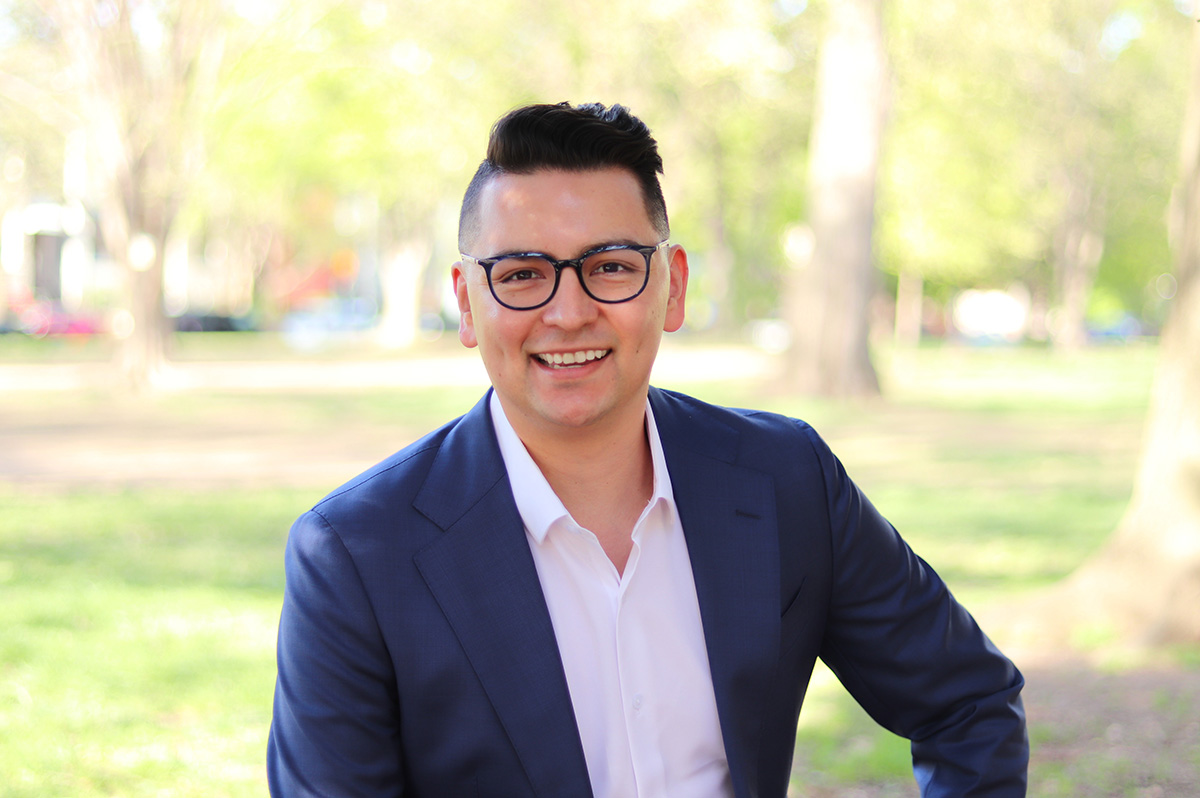
The Wanda Alston Foundation, the D.C.-based organization that has provided housing and support services for homeless LGBTQ youth since its founding in 2008, announced it has appointed longtime LGBTQ rights advocate Cesar Toledo as its new executive director.
In an April 22 statement, the organization said that as part of a planned leadership transition launched in November 2024, Toledo will succeed June Crenshaw, who Alston Foundation officials and LGBTQ community activists say has led the organization with distinction in her role as executive director for the past nine years.
In a statement released last November, the foundation announced Crenshaw was stepping down from her role as executive director after deciding to “to step into her next chapter.”
“June’s leadership has been truly transformative,” said Alston Foundation Board Chair Darrin Glymph in the group’s April 22 statement. “We are immensely grateful for her dedication and equally excited for the energy and experience that Cesar brings to lead us into this next chapter,” Glymph said.
“A seasoned LGBTQ+ advocate, Cesar brings over a decade of experience leading national campaigns, shaping public policy, and building inclusive communities,” the statement released by the group says. “Most recently, he served as the National LGBTQ+ Engagement Director for the Harris for President Campaign and has built a career focused on advancing equality and equitable education,” it says.
Biographical information about Toledo shows that immediately prior to working for the Harris For President Campaign, he served since April 2023 as deputy director for Democrats for Education Reform DC (DFER DC), a political group that helps to elect candidates for public office committed to quality education for all students, including minorities, people of color and LGBTQ youth.
Before joining DFER DC, Toledo served as political director for the LGBTQ+ Victory Fund, where he assisted in electing out LGBTQ candidates to all levels of public office across the U.S.
“I’m really excited about joining the Wanda Alston Foundation,” Toledo told the Washington Blade. “After a decade of working at the intersection of politics and policy and advancing political candidates and equitable education here in D.C., I wanted to shift my career to direct services to the most vulnerable folks in the LGBTQ+ family and our homeless youth,” he said.
Among other things, he said he would push for increasing the Alston Foundation’s visibility and mainlining its services for LGBTQ youth at a time when the national political climate has become less supportive.
A statement on its website says the Alston Foundation was founded in 2008 “in memory of Wanda Alston, a fierce LGBTQ+ activist, national advocate, and government official who was admired by District residents.”
The statement adds, “The foundation opened the first housing program in the nation’s capital in 2008 providing pre-independent transitional living and life-saving support services to LGBTQ+ youth.”
In a separate statement, the Alston Foundation announced it would hold a “thank you” celebration of appreciation for June Crenshaw from 6-8 p.m. on May 20 at Crush Dance Bar located at 2007 14th Street, N.W. in D.C.
“Let’s come together to celebrate her dedication and commitment for everything she has done for the LGBTQIA homeless youth population,” the statement says.
Federal Government
HHS to retire 988 crisis lifeline for LGBTQ youth
Trevor Project warns the move will ‘put their lives at risk’

The U.S. Department of Health and Human Services is planning to retire the national 988 crisis lifeline for LGBTQ youth on Oct. 1, according to a preliminary budget document obtained by the Washington Post.
Introduced during the Biden-Harris administration in 2022, the hotline connects callers with counselors who are trained to work with this population, who are four times likelier to attempt suicide than their cisgender or heterosexual counterparts.
“Suicide prevention is about risk, not identity,” said Jaymes Black, CEO of the Trevor Project, which provides emergency crisis support for LGBTQ youth and has contracted with HHS to take calls routed through 988.
“Ending the 988 Suicide and Crisis Lifeline’s LGBTQ+ youth specialized services will not just strip away access from millions of LGBTQ+ kids and teens — it will put their lives at risk,” they said in a statement. “These programs were implemented to address a proven, unprecedented, and ongoing mental health crisis among our nation’s young people with strong bipartisan support in Congress and signed into law by President Trump himself.”
“I want to be clear to all LGBTQ+ young people: This news, while upsetting, is not final,” Black said. “And regardless of federal funding shifts, the Trevor Project remains available 24/7 for anyone who needs us, just as we always have.”
The service for LGBTQ youth has received 1.3 million calls, texts, or chats since its debut, with an average of 2,100 contacts per day in February.
“I worry deeply that we will see more LGBTQ young people reach a crisis state and not have anyone there to help them through that,” said Janson Wu, director of advocacy and government affairs at the Trevor Project. “I worry that LGBTQ young people will reach out to 988 and not receive a compassionate and welcoming voice on the other end — and that will only deepen their crisis.”
Under Trump’s HHS secretary, Robert F. Kennedy, Jr., the agency’s departments and divisions have experienced drastic cuts, with a planned reduction in force of 20,000 full-time employees. The Substance Abuse and Mental Health Services Administration has been sunset and mental health services consolidated into the newly formed Administration for a Healthy America.
The budget document reveals, per Mother Jones, “further sweeping cuts to HHS, including a 40 percent budget cut to the National Institutes of Health; elimination of funding for Head Start, the early childhood education program for low-income families; and a 44 percent funding cut to the Centers for Disease Control, including all the agency’s chronic disease programs.”
Virginia
Gay talk show host wins GOP nom for Va. lieutenant guv
John Reid becomes first out gay nominee for statewide office in state
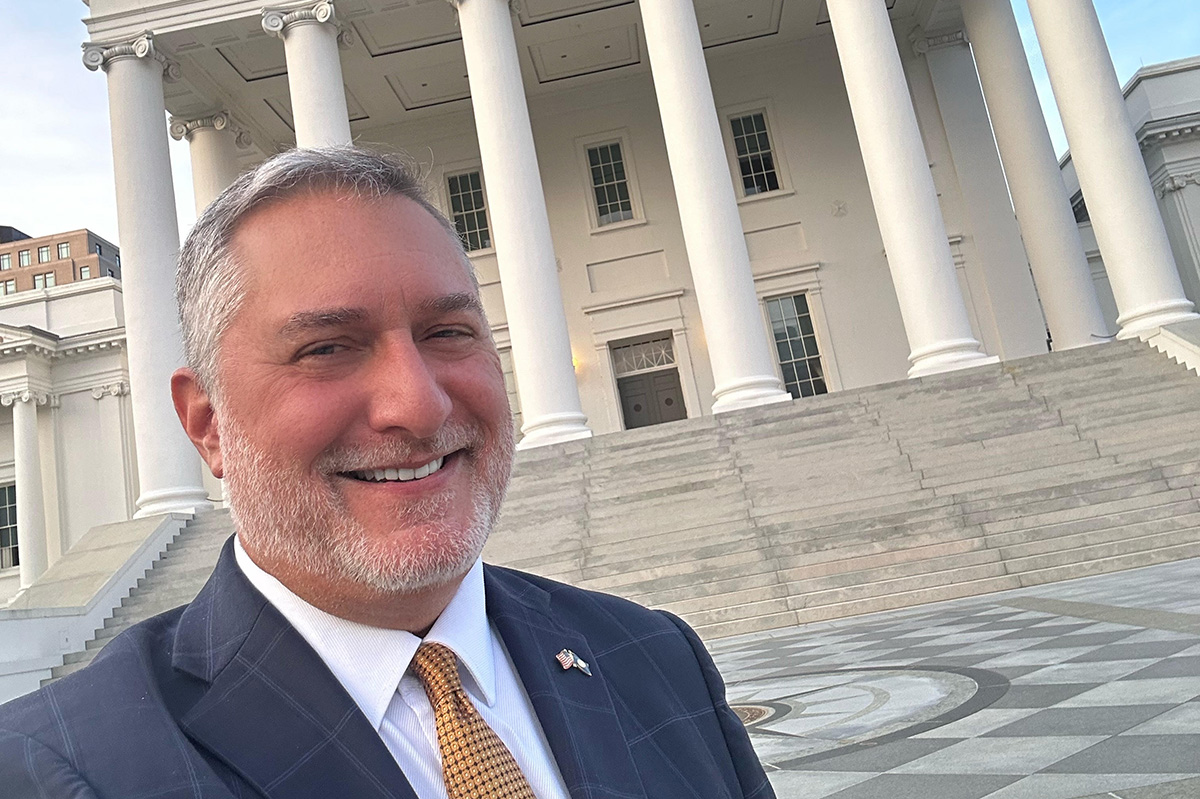
John Reid, a conservative gay radio talk show host in Richmond for many years, this week secured the Republican nomination for the office of lieutenant governor in Virginia, becoming the first known openly gay person to be nominated for a statewide office in that state.
Reid secured the nomination after his only rival in the Republican primary, Fairfax County Supervisor Pat Herrity, dropped out of the race this week for health reasons.
Herrity’s decision to withdraw from the race finalized the GOP nominees for Virginia’s three statewide contests in the November general election in what political observers are calling an unusually diverse GOP slate.
Current Virginia Lt. Gov. Winsome Earle-Sears, a Black woman, captured the GOP nomination for governor without a GOP opponent. Jason S. Miyares, a Hispanic man, is running for re-election as Virginia attorney general without a GOP rival. And Reid, a gay man, is the GOP nominee for lieutenant governor.
Reid will face one of six Democratic candidates for lieutenant governor who are competing in the June 17 Democratic primary.
The Blade spoke with Reid on Tuesday. Below is a partial transcript of that interview.
Blade: Is there a message you have for LGBTQ voters in Virginia, including Democrats, for why you think they should vote for you?
Reid: Well, the thing that I would say to gay voters who are looking and examining the candidates, is that I was out of the closet as a gay Republican publicly in very difficult rooms where people weren’t accepting of gay men – long before Donald Trump said I don’t care about this stuff.
And long before polite society said this was OK. So, in the ‘90s I came out on television and said on Oct. 11 – it was on National Coming Out Day. It was probably in 1996 or 1997. I started at the TV station in 1994. So, it was a couple of years into it.
I came out and said you never know your news anchor could be gay on National Coming Out Day. And everyone was appalled. How can you say this? You’re not supposed to say something like that. So even though I’m a Republican I know some people in the LGBT community are reflexively hostile to Republicans.
I took that step in public, and I think I helped change a lot of minds within the Republican Party and within central Virginia, which continues to be a pretty conservative place by being true to who I am. I spoke out in meetings around Republican staff and legislators and said I think we are not doing the right thing by being hostile to gay marriage.
We talk about the importance of family – Republicans talk about the importance of family, the importance of marriage as a fundamental building block of society. And a gay marriage is a net positive. Is it biblical to people who are following traditional Christian theology? No. But is it good for our society to have people in committed relationships? I think yes.
When we were going through the debate over gays in the military I said I see no reason that someone who is qualified to be in the military and can meet every single standard that everyone else is asked to meet, why should they not be in the Naval Academy, the Air Force Academy, West Point? Or serving as a grunt in active duty. Why would we exclude those people?
And those were very unpopular positions within the Republican Party.
Blade: Your campaign website says you have supported civil unions for same-sex couples. I could have missed seeing it, but I didn’t see an expression of support for gay marriage. Are you saying now that you support full same-sex marriage?
Reid: You know, you’re right. There is a distinction. And I think marriage is completely legitimate. Civil unions – if you want to go and sign paperwork at the courthouse – that’s great. If you want to be married and if a church wants to marry you if you find a church and religious leader and group that wants to bless that – that’s what I hope to do with my partner now.
Sometime in the near future I hope we will be married. And it’s very important to me as a Christian to be married in a church. So, that’s interesting. Most people would not draw that distinction. I appreciate that you’re drawing a distinction. I’m supportive of both.
Blade: Did you say you worked for a member of Congress? Can you say who that was?
Reid: George Allen, the senator from Virginia. And, of course, you and I – I know you’ve covered so many stories like this that you’ve brought together. But it was a very difficult position. When I started with Sen. Allen, he had a very libertarian attitude about this. The [Virginia State] constitutional amendment was not necessary. There was no need to go down that road.
And of course President Bush – George W. – was very assertive during the 2004 campaign. And then the issue continued to bubble up and you know we wound up with this amendment in the Virginia Constitution that banned gay marriage until the Supreme Court decision. And I was not supportive of that. And I voted for my boss, my senator, who I respected and still do respect.
Blade: Your website shows that your support for the gay community does not extend to the transgender community.
Reid: Yeah, I hate this. But I do think that our current focus on trans issues is where the gay rights movement has jumped the shark. And I think we’re losing support that we worked very diligently for decades to build with the average person. And I’m puzzled that the former leaders of the Human Rights Campaign had presidents when Elizabeth Birch and others – I don’t know what their stance is today.
I do recall that all of us who talked about gay rights issues focused on normalcy and that we would meet every standard that everyone else met. That all the vile things that were said about gays being pedophiles and grooming children – that simply was not true.
And I think we have stumbled into a very unfortunate and dangerous territory where we’re almost taunting the average person with an insistence that they accept drag queen story hour and the provocative books and provocative media that the average person would say, ‘You told us you were normal. – quote unquote normal – and now you are peddling an agenda which we don’t agree with and you’re being really aggressive about it.
And that’s really a difference. I know you’ve been covering it for a long time. I don’t know if you agree with this. I think we are peddling a very different political agenda today than the gay community was 20 years ago. And I think we should restrain ourselves and be cautious about that. And I think we’re in dangerous territory with the general population. And I’d urge caution about that.
Blade: Online reports show that there are as many as six Democratic candidates competing for the lieutenant governor’s position in the June 17 Democratic primary. Do you know any of them?
Reid: I’m familiar with most of them. Some are from the Richmond area. And I believe they are all very supportive of gay rights, which is I think a good thing. My reason for challenging them as a Republican – and I think there are other places where there is a lack of appropriate leadership and good judgment. And so, I don’t expect the gay issue would be a real issue. The trans issue may be a point of contention in the race.
But I don’t think the gay issue – and I do draw a distinction between the two — I don’t think that will be a real dividing line with those Democrat[ic] candidates.
Blade: So unlike when you were a TV news anchor, on your radio talk show were you able to offer more opinions and commentary?
Reid: That’s correct. There was a lot of opining, no script. So, I was able to tell stories about how I traveled to Miami, and I went to Washington. I went to the Kennedy Center and shared some of my life and lifestyle as appropriate with the audience.
Blade: Well, thank you for this interview.
Reid: I’m happy to talk to you. One of the reasons I called you back is that the political consultants have always told me don’t talk to anybody that might disagree with you. And I reject that. I have already lived 30 years as an out gay man. And it has been very difficult. And I would like to make it easier for the next generation to live their authentic selves. … Calling you and talking to you against the advice of all these people who say never do that, I’m hopeful that my willingness to engage and be candid will ultimately be well received, I hope.
-

 U.S. Federal Courts4 days ago
U.S. Federal Courts4 days agoFederal judge blocks Trump passport executive order
-

 Obituary5 days ago
Obituary5 days agoLocal attorney, LGBTQ rights advocate Dale Sanders dies at 75
-

 Mexico5 days ago
Mexico5 days agoGay couple claims Puerto Vallarta wedding venue discriminated against them
-

 Books4 days ago
Books4 days ago‘Pronoun Trouble’ reminds us that punctuation matters





